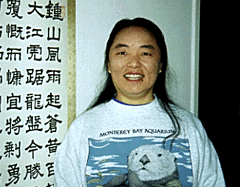![[Currents header graphic]](/homeart/currents_header.gif)
![[Currents header graphic]](/homeart/currents_header.gif)
December 8, 1997

|
|
Changhua Sun Rich
|
Changhua Rich credits her academic success in part to her background, which includes working in what she calls "the real world" until she was 32 years old. "I have a strong sense of how people in the real world are going to respond," she said. "And I always ask myself 100 times how something is going to play out."
Rich's success is all the more impressive considering the hardships she has faced. She came to the United States from China 10 years ago with only a fourth-grade education. Since then, she has earned her undergraduate degree, her master's, and is on the verge of receiving her doctorate in economics from UCSC.
Her grade school education was interrupted in 1966 by the Cultural Revolution, and Rich was sent to the Chinese countryside. Her father, the leader of a non-Communist political party, was imprisoned for seven years, and Rich wandered for months before spending several years working 16-hour days in the fields.
"That was such hard work, especially for someone from the city," recalled Rich, standing up to demonstrate the motion of harvesting wheat with a sickle. She pushed herself hard to excel, and it showed: "By the second year I was almost as good as the villagers, and by the third year I knew I was just as fast as anybody."
Despite her lack of formal education, Rich read voraciously and was chosen to teach in the village school, where some families with seven or eight children were so poor that they could afford clothes for only one child. The children would take turns attending school while the others stayed home, warming themselves with the heat from the cooking fire.
Rich's father was released in 1975 toward the end of the revolution, and Rich returned to Beijing, where she worked for a construction company alongside released convicts. Rich remained very much on her own. "My father is a very principled man," she said. "He never used his connections to help me change jobs."
Rich never returned to the university, saying now that she didn't trust the school system because it had been so politicized and treated her so poorly. By the early 1980s, Rich was divorced and working as a secretary and translator for a Danish company.
"I audited English classes in the language school, and after four years of working for this company, I realized that I could do what my boss was doing and earn $100,000 a year instead of $100 a month," recalled Rich. "Being a divorced 32-year-old woman in China made me damaged goods, and I realized I had to go back to school. But the school-age limit is 25."
So Rich began applying to schools in the United States. "I've always been a nonconformist, and I suddenly woke up and said 'Well, what can I lose?'" said Rich, who sent letters to more than two dozen schools--"mostly little schools with open admissions policies." She received six catalogs and wrote to each school, telling her life story in the personal statement sections of the applications. Then she waited, expecting nothing.
But before long, Rich received a letter from Paul Husson, director of admissions for Husson College in Bangor, Maine, offering her a full scholarship with room and board to study business administration. She jumped at the opportunity, ultimately transferring to the University of Southern Maine, where she earned her bachelor's degree with honors in economics in 1992.
Her interest in economics stems from the changes she witnessed in the wake of China's economic reforms.
"The economic incentive system is so powerful," she said. "It really changed people's lives. When I was teaching school, it was in a three-room schoolhouse with a dirt floor. Now they have a new three-story building with a brand-new piano, and the kids are dressed just like here."
She came to UCSC in part because of its history of supporting nonconventional thinkers: "I just feel oppressed if somebody says you have to think a certain way," she said.
Rich, who hopes to find a teaching position in California, feels that her background has made her a better teacher, too. "I had a student tell me she wanted to major in global economics, but she had failed her high school calculus class and was scared," said Rich. "I told her that it's good she wants to do something hard and to just try to overcome it. I told her 'Do not let that stand in your way.'"
Sage advice from one who knows.